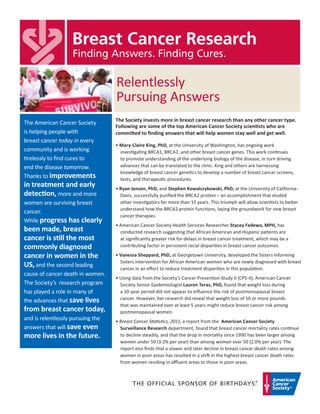
Breast cancer research
- 1. Breast Cancer Research Finding Answers. Finding Cures. Relentlessly Pursuing Answers The Society invests more in breast cancer research than any other cancer type. The American Cancer Society Following are some of the top American Cancer Society scientists who are is helping people with committed to finding answers that will help women stay well and get well. breast cancer today in every • Mary-Claire King, PhD, at the University of Washington, has ongoing work community and is working investigating BRCA1, BRCA2, and other breast cancer genes. This work continues tirelessly to find cures to to promote understanding of the underlying biology of the disease, in turn driving end the disease tomorrow. advances that can be translated to the clinic. King and others are harnessing knowledge of breast cancer genetics to develop a number of breast cancer screens, Thanks to improvements tests, and therapeutic procedures. in treatment and early • Ryan Jensen, PhD, and Stephen Kowalczykowski, PhD, at the University of California- detection, more and more Davis, successfully purified the BRCA2 protein – an accomplishment that eluded women are surviving breast other investigators for more than 15 years. This triumph will allow scientists to better understand how the BRCA2 protein functions, laying the groundwork for new breast cancer. cancer therapies. While progress has clearly • American Cancer Society Health Services Researcher Stacey Fedewa, MPH, has been made, breast conducted research suggesting that African American and Hispanic patients are cancer is still the most at significantly greater risk for delays in breast cancer treatment, which may be a commonly diagnosed contributing factor in persistent racial disparities in breast cancer outcomes. cancer in women in the • Vanessa Sheppard, PhD, at Georgetown University, developed the Sisters Informing Sisters intervention for African American women who are newly diagnosed with breast US, and the second leading cancer in an effort to reduce treatment disparities in this population. cause of cancer death in women. • Using data from the Society’s Cancer Prevention Study II (CPS-II), American Cancer The Society’s research program Society Senior Epidemiologist Lauren Teras, PhD, found that weight loss during has played a role in many of a 10-year period did not appear to influence the risk of postmenopausal breast the advances that save lives cancer. However, her research did reveal that weight loss of 10 or more pounds that was maintained over at least 5 years might reduce breast cancer risk among from breast cancer today, postmenopausal women. and is relentlessly pursuing the • Breast Cancer Statistics, 2011, a report from the American Cancer Society answers that will save even Surveillance Research department, found that breast cancer mortality rates continue more lives in the future. to decline steadily, and that the drop in mortality since 1990 has been larger among women under 50 (3.2% per year) than among women over 50 (2.0% per year). The report also finds that a slower and later decline in breast cancer death rates among women in poor areas has resulted in a shift in the highest breast cancer death rates from women residing in affluent areas to those in poor areas.
- 2. The Facts Putting Answers into Action For more than 65 years, the American Cancer Society research program has been finding the answers that help us understand how to prevent, detect, and • An estimated 226,870 treat all cancer types, including breast cancer. With support from American women in the US will be Cancer Society funding during their careers, these pioneers in breast cancer diagnosed with breast cancer research laid the foundation for breast cancer treatments that are saving lives in 2012. today: • An estimated 39,920 women 1950s – Stanley Cohen, PhD, discovered the epidermal growth factor receptor (EGFR), which is linked to cell growth and multiple cancer types. Studies are in the US will die from the currently under way to see if anti-EGFR drugs that are already used to treat other disease in 2012. types of cancers, such as cetuximab (Erbitux®) and erlotinib (Tarceva®), might also work against breast cancer. Cohen was later awarded a Nobel Prize for his work. • Breast cancer death rates have decreased by 32% 1974 – V. Craig Jordan, PhD, showed that tamoxifen could prevent breast cancer in rats by binding to the estrogen receptor. Tamoxifen was approved by the FDA between 1990 and 2008 (the for treating estrogen receptor positive breast cancer in 1978. most recent year for which 1978 – Bernard Fisher, MD, Richard Love, MD, and V. Craig Jordan, PhD, data are available). This developed and carried out the first trial of tamoxifen to prevent recurrence in means that women in the US breast cancer survivors. in 2008 had a 32% lower risk 1979 – Arnold Levine, MD, discovered the p53 protein, later shown to be a tumor of dying from breast cancer suppressor gene mutated in more than half of all cancers, including breast cancer. than in 1990. 1988 – Dennis Slamon, MD, discovered that the her2/neu growth factor receptor is overexpressed in 15-30% of breast cancers, and is an unfavorable prognostic • More than 147,000 breast feature. Slamon went on to develop Herceptin (trastuzumab), which is used today cancer deaths have been to treat thousands of women with breast cancer. prevented since death rates 1998 – Bernard Fisher, MD, reported that tamoxifen reduces the incidence of started dropping in 1990. breast cancer by 49% in high-risk women. 2001 – Walt Disney-American Cancer Society Research Professor for Breast Cancer Mary Claire King, PhD, along with former Society grantee Bernard Fischer, MD, reported that tamoxifen prevents recurrence of breast cancer in BRCA2 but not BRCA1 patients. Today, the American Cancer Society is supporting more than 230 grants with $82 million to find the answers that will help save lives from breast cancer. We save lives and create more birthdays by helping you stay well, helping you get well, by finding cures, and by fighting back. ©2011, American Cancer Society, Inc. cancer.org | 1.800.227.2345 No.004590 Rev. 05/12